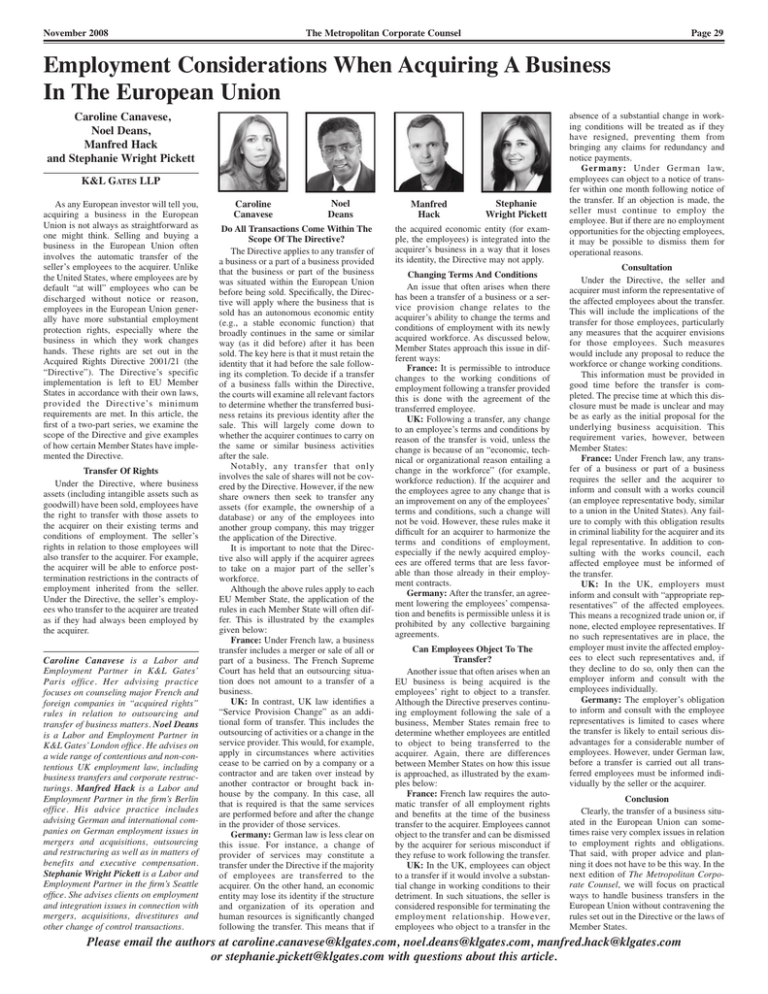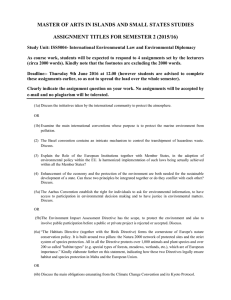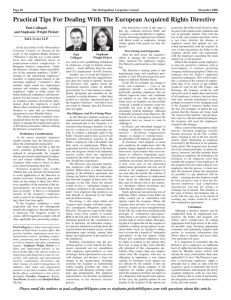Document 13356601
advertisement

November 2008 The Metropolitan Corporate Counsel Page 29 Employment Considerations When Acquiring A Business In The European Union Caroline Canavese, Noel Deans, Manfred Hack and Stephanie Wright Pickett K&L GATES LLP As any European investor will tell you, acquiring a business in the European Union is not always as straightforward as one might think. Selling and buying a business in the European Union often involves the automatic transfer of the seller’s employees to the acquirer. Unlike the United States, where employees are by default “at will” employees who can be discharged without notice or reason, employees in the European Union generally have more substantial employment protection rights, especially where the business in which they work changes hands. These rights are set out in the Acquired Rights Directive 2001/21 (the “Directive”). The Directive’s specific implementation is left to EU Member States in accordance with their own laws, provided the Directive’s minimum requirements are met. In this article, the first of a two-part series, we examine the scope of the Directive and give examples of how certain Member States have implemented the Directive. Transfer Of Rights Under the Directive, where business assets (including intangible assets such as goodwill) have been sold, employees have the right to transfer with those assets to the acquirer on their existing terms and conditions of employment. The seller’s rights in relation to those employees will also transfer to the acquirer. For example, the acquirer will be able to enforce posttermination restrictions in the contracts of employment inherited from the seller. Under the Directive, the seller’s employees who transfer to the acquirer are treated as if they had always been employed by the acquirer. Caroline Canavese is a Labor and Employment Partner in K&L Gates’ Paris office. Her advising practice focuses on counseling major French and foreign companies in “acquired rights” rules in relation to outsourcing and transfer of business matters. Noel Deans is a Labor and Employment Partner in K&L Gates’ London office. He advises on a wide range of contentious and non-contentious UK employment law, including business transfers and corporate restructurings. Manfred Hack is a Labor and Employment Partner in the firm’s Berlin office. His advice practice includes advising German and international companies on German employment issues in mergers and acquisitions, outsourcing and restructuring as well as in matters of benefits and executive compensation. Stephanie Wright Pickett is a Labor and Employment Partner in the firm’s Seattle office. She advises clients on employment and integration issues in connection with mergers, acquisitions, divestitures and other change of control transactions. Noel Caroline Deans Canavese Do All Transactions Come Within The Scope Of The Directive? The Directive applies to any transfer of a business or a part of a business provided that the business or part of the business was situated within the European Union before being sold. Specifically, the Directive will apply where the business that is sold has an autonomous economic entity (e.g., a stable economic function) that broadly continues in the same or similar way (as it did before) after it has been sold. The key here is that it must retain the identity that it had before the sale following its completion. To decide if a transfer of a business falls within the Directive, the courts will examine all relevant factors to determine whether the transferred business retains its previous identity after the sale. This will largely come down to whether the acquirer continues to carry on the same or similar business activities after the sale. Notably, any transfer that only involves the sale of shares will not be covered by the Directive. However, if the new share owners then seek to transfer any assets (for example, the ownership of a database) or any of the employees into another group company, this may trigger the application of the Directive. It is important to note that the Directive also will apply if the acquirer agrees to take on a major part of the seller’s workforce. Although the above rules apply to each EU Member State, the application of the rules in each Member State will often differ. This is illustrated by the examples given below: France: Under French law, a business transfer includes a merger or sale of all or part of a business. The French Supreme Court has held that an outsourcing situation does not amount to a transfer of a business. UK: In contrast, UK law identifies a “Service Provision Change” as an additional form of transfer. This includes the outsourcing of activities or a change in the service provider. This would, for example, apply in circumstances where activities cease to be carried on by a company or a contractor and are taken over instead by another contractor or brought back inhouse by the company. In this case, all that is required is that the same services are performed before and after the change in the provider of those services. Germany: German law is less clear on this issue. For instance, a change of provider of services may constitute a transfer under the Directive if the majority of employees are transferred to the acquirer. On the other hand, an economic entity may lose its identity if the structure and organization of its operation and human resources is significantly changed following the transfer. This means that if Stephanie Manfred Wright Pickett Hack the acquired economic entity (for example, the employees) is integrated into the acquirer’s business in a way that it loses its identity, the Directive may not apply. Changing Terms And Conditions An issue that often arises when there has been a transfer of a business or a service provision change relates to the acquirer’s ability to change the terms and conditions of employment with its newly acquired workforce. As discussed below, Member States approach this issue in different ways: France: It is permissible to introduce changes to the working conditions of employment following a transfer provided this is done with the agreement of the transferred employee. UK: Following a transfer, any change to an employee’s terms and conditions by reason of the transfer is void, unless the change is because of an “economic, technical or organizational reason entailing a change in the workforce” (for example, workforce reduction). If the acquirer and the employees agree to any change that is an improvement on any of the employees’ terms and conditions, such a change will not be void. However, these rules make it difficult for an acquirer to harmonize the terms and conditions of employment, especially if the newly acquired employees are offered terms that are less favorable than those already in their employment contracts. Germany: After the transfer, an agreement lowering the employees’ compensation and benefits is permissible unless it is prohibited by any collective bargaining agreements. Can Employees Object To The Transfer? Another issue that often arises when an EU business is being acquired is the employees’ right to object to a transfer. Although the Directive preserves continuing employment following the sale of a business, Member States remain free to determine whether employees are entitled to object to being transferred to the acquirer. Again, there are differences between Member States on how this issue is approached, as illustrated by the examples below: France: French law requires the automatic transfer of all employment rights and benefits at the time of the business transfer to the acquirer. Employees cannot object to the transfer and can be dismissed by the acquirer for serious misconduct if they refuse to work following the transfer. UK: In the UK, employees can object to a transfer if it would involve a substantial change in working conditions to their detriment. In such situations, the seller is considered responsible for terminating the employment relationship. However, employees who object to a transfer in the absence of a substantial change in working conditions will be treated as if they have resigned, preventing them from bringing any claims for redundancy and notice payments. Germany: Under German law, employees can object to a notice of transfer within one month following notice of the transfer. If an objection is made, the seller must continue to employ the employee. But if there are no employment opportunities for the objecting employees, it may be possible to dismiss them for operational reasons. Consultation Under the Directive, the seller and acquirer must inform the representative of the affected employees about the transfer. This will include the implications of the transfer for those employees, particularly any measures that the acquirer envisions for those employees. Such measures would include any proposal to reduce the workforce or change working conditions. This information must be provided in good time before the transfer is completed. The precise time at which this disclosure must be made is unclear and may be as early as the initial proposal for the underlying business acquisition. This requirement varies, however, between Member States: France: Under French law, any transfer of a business or part of a business requires the seller and the acquirer to inform and consult with a works council (an employee representative body, similar to a union in the United States). Any failure to comply with this obligation results in criminal liability for the acquirer and its legal representative. In addition to consulting with the works council, each affected employee must be informed of the transfer. UK: In the UK, employers must inform and consult with “appropriate representatives” of the affected employees. This means a recognized trade union or, if none, elected employee representatives. If no such representatives are in place, the employer must invite the affected employees to elect such representatives and, if they decline to do so, only then can the employer inform and consult with the employees individually. Germany: The employer’s obligation to inform and consult with the employee representatives is limited to cases where the transfer is likely to entail serious disadvantages for a considerable number of employees. However, under German law, before a transfer is carried out all transferred employees must be informed individually by the seller or the acquirer. Conclusion Clearly, the transfer of a business situated in the European Union can sometimes raise very complex issues in relation to employment rights and obligations. That said, with proper advice and planning it does not have to be this way. In the next edition of The Metropolitan Corporate Counsel, we will focus on practical ways to handle business transfers in the European Union without contravening the rules set out in the Directive or the laws of Member States. Please email the authors at caroline.canavese@klgates.com, noel.deans@klgates.com, manfred.hack@klgates.com or stephanie.pickett@klgates.com with questions about this article.


